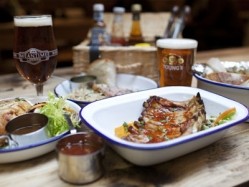The gastropub revolution: Pub-restaurants begin to dominate eating-out market

That’s according to a new report by foodservice consultancy Horizons, which reveals that managed pub-restaurants now hold a 22 per cent share of the pub, restaurant and quick-service market – up from 18 per cent in 2008.
Moreover, Horizons expects this proportion to rise by 26 per cent in 2016.
“Consumers are choosing to eat in pub-restaurants over other types of restaurant and this trend is likely to continue over the next few years,” said Horizons’ managing director Peter Backman.
Replacing drinks sales
“Managed pubs are doing a brilliant job at appealing to today’s consumer by being flexible in their offer and price-sensitive.
“In June 2011 our own QuickBite survey of 2,000 consumers showed that pub restaurants accounted for 17 per cent of all meals eaten out.By December 2012 this had risen to 20 per cent.
“Managed pubs are certainly getting something right in terms of their food, which is successfully filling the gap left by retreating alcohol sales. With growth at the current rate likely to continue, we expect food to account for 50 per cent of managed pub sales by 2023.”
The managed pub restaurant sector consists of almost 17,000 pubs and has combined food and associated beverage sales worth £4.8bn in 2012 – 39 per cent of their total sales. Leading operators include Mitchells & Butlers,JD Wetherspoon, Whitbread, Greene King, Spirit and Marston’s.
Dynamism & distinction
The sector has been able to increase its share of food sales by successfully adjusting to changing consumer demand. Breakfast, for example, has become a growing revenue stream, accounting for 6 per cent of all managed pub meals, with sales now worth £280m a year.
Sales of midday meals – both weekdays and weekends – have also increased substantially, growing in value from £855m in 2006 to almost £1.5bn in 2012.
“The managed pub restaurant market is dynamic,” added Backman. “It leads the way in giving old favourites a new twist and capitalising on the latest trends.
“This sector has become a significant eating out market that is distinct from other sectors by offering consumers a product, service and atmosphere that they can’t get elsewhere.”
Managed pubs: Facts & figures...
- Managed pubs served 453m meals in 2012
- The average price for a main course in the managed pub sector is £5.48; £3.61 for a starter, and £3.01 for a dessert
- The price of an average meal is £9.41
- In 2012, the top eight operators had food and associated beverage sales of £2.5bn
- Mitchells & Butlers, the largest managed pub operator, sells more food in total than the biggest restaurant operators, with 48 per cent of its total sales accounted for by food
- Food sales at Marston’s represents 44 per cent of its total sales, with food sales at Greene King reaching 38 per cent of its total sales.

































